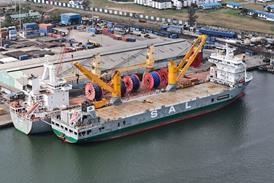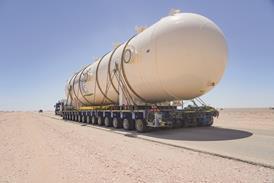For the first nine months of 2024, the port of Antwerp-Bruges saw a total throughput of 210.5 million tonnes, an increase of 3 percent compared to the same period last year and a stabilisation in comparison to the second quarter of 2024.
The port said that demand for container transport remains strong, while ongoing geopolitical and economic instability has impacted other cargo types.
Conventional general cargo performed strongly in the second quarter, but throughput fell in the third, bringing total throughput for the first nine months of 2024 down by 4.8 percent compared to last year. Iron and steel decreased slightly by 0.6 percent, with increased exports (+4 percent) partially offsetting lower imports (-3.5 percent).
This decline is due to a lower demand from steel processing sectors such as construction and automotive. Other products in this sector showed declines including wood (-32.9 percent), paper and cellulose (-22.6 percent) and construction materials (-36.9 percent).
Overall, ro-ro volumes dropped by 5.5 percent, with high and heavy items down 23.5 percent year on year. Container throughput in tons increased by 8.9 percent, with imports increasing by 10.2 percent and exports by 7.9 percent.
Despite ongoing geopolitical and economic challenges, port of Antwerp-Bruges’ said that its growth is stabilising. It highlighted the expansion of Zuidnatie, which started with the construction of a new warehouse for processing steel coils this summer, and the acquisition of Luik Natie by Lineage, as evidence of the port’s continuing focus in specialist segments.
Other developments noted by the port include the investment by A.P. Moller Holding in Vioneo, a large-scale fossil-free plastics production plant, and a plastics-to-chemicals (P2C) project by Indaver. It said the initiatives align with port’s focus on sustainability, as Vioneo will boost fossil-free production capacity, while the P2C project converts captured CO₂ into valuable chemicals.
In response to evolving industry demands, private companies at the Antwerp platform have invested over EUR10 billion (USD10.8 billion) in recent years to upgrade and expand its industrial capabilities. Key projects include the construction of a new ethane cracker for Ineos to significantly increase ethylene production capacity
Additionally, port of Antwerp-Bruges is developing one of Europe’s largest platforms for green hydrogen import and distribution, a critical resource for reducing industrial emissions. And Borealis is advancing the construction of a propane dehydrogenation (PDH) plant to bolster propylene production, supporting the plastics manufacturing industry.
















